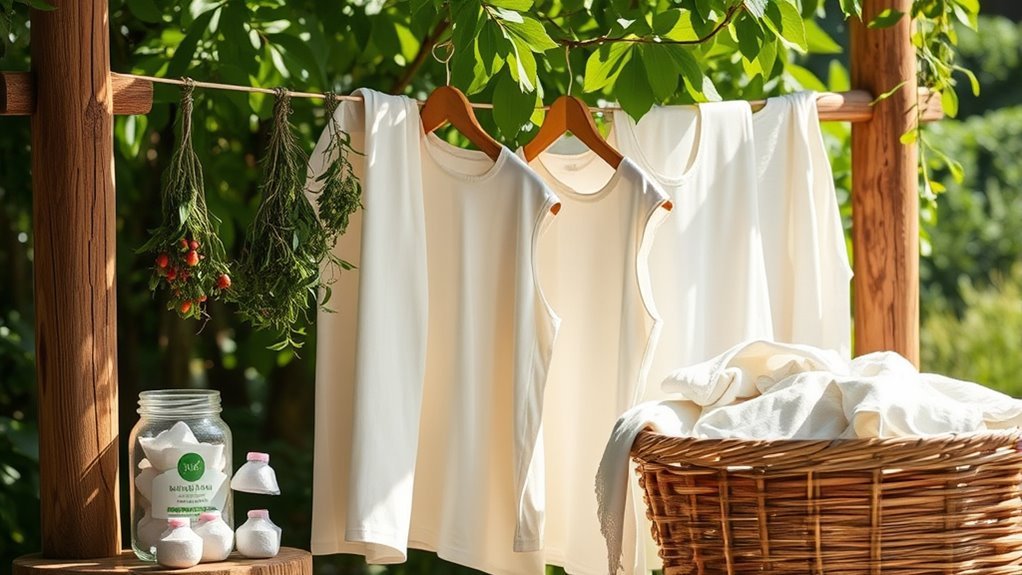Eco-Friendly Alternatives to Laundry
You can make your laundry more eco-friendly by choosing biodegradable detergents and natural fabric softeners like vinegar or baking soda. Wash clothes in cold water and run full loads to save energy and water. Consider energy-efficient machines and air-dry your clothes to cut down electricity use. Using laundry balls and eco-friendly boosters can reduce chemicals and waste. Keep your machine well-maintained to guarantee it runs efficiently. Keep going to discover more ways to green your laundry routine.
Choosing Biodegradable Detergents

Why should you consider biodegradable detergents for your laundry? Because choosing products with biodegradable ingredients lets you clean your clothes without harming the planet. These detergents break down naturally, preventing toxic buildup in waterways and soil. When you pick a detergent wrapped in sustainable packaging, you’re cutting down on plastic waste and supporting companies committed to eco-friendly practices. It’s about reclaiming your freedom to make choices that align with your values—protecting nature while keeping your laundry fresh. By switching to biodegradable detergents, you’re not just washing clothes; you’re embracing a lifestyle that respects the Earth and its resources. It’s a simple yet powerful way to live sustainably without compromising on effectiveness or convenience. Your laundry routine can be green, guilt-free, and truly liberating.
Utilizing Cold Water Wash Cycles
You can save a lot of energy by switching to cold water wash cycles without sacrificing cleaning power, thanks to detergents designed for lower temperatures. Cold water is gentler on your clothes, helping fabrics last longer and keep their color. Let’s explore how this simple change benefits both your laundry and the environment.
Energy Savings Benefits
Although warm or hot water might seem necessary for cleaning, using cold water wash cycles can greatly cut your energy consumption. When you switch to cold water, you’re adopting energy efficient practices that reduce the power needed to heat water, which accounts for a large chunk of your laundry’s energy use. This simple change doesn’t just save you money—it’s a step toward sustainable laundry solutions that free you from wasteful habits. By embracing cold water washes, you take control of your energy footprint without sacrificing cleanliness. This shift aligns perfectly with a lifestyle that values freedom and responsibility, empowering you to make eco-friendly choices easily and effectively every time you do laundry.
Detergent Effectiveness in Cold
While cold water wash cycles save energy, many wonder if detergents can perform just as well without warm water. You’ll be glad to know that modern cold detergent performance has come a long way. Formulated with enzymes and surfactants designed to activate in cooler temperatures, these detergents maintain impressive stain removal efficacy. This means you don’t have to sacrifice cleanliness for the sake of the environment. Using cold water not only reduces your energy bill but also protects your clothes from fading and shrinking. So, if you want the freedom to wash efficiently and sustainably, choosing a detergent optimized for cold water lets you do just that—keeping your laundry fresh without the need for heat. It’s a smart, eco-friendly choice that works with your lifestyle.
Fabric Care Advantages
Since cold water wash cycles are gentler on fabrics, you’ll notice your clothes last longer and look better over time. This means you’re not only preserving fabric longevity but also honoring the sustainable materials your wardrobe is made from. Hot water can weaken fibers and cause colors to fade faster, limiting your freedom to wear your favorite pieces without worry. By choosing cold water, you reduce wear and tear, helping your clothes maintain their shape and feel. Plus, this approach aligns with eco-friendly practices, conserving energy and lowering your environmental footprint. When you embrace cold water washes, you’re making a smart, sustainable choice that keeps your garments vibrant and durable, giving you the freedom to enjoy your clothes day after day without sacrifice.
Opting for Energy-Efficient Washing Machines
When you’re ready to upgrade your laundry routine, choosing an energy-efficient washing machine can make a big difference in reducing your environmental impact. You’ll enjoy more freedom by cutting energy consumption without sacrificing performance. Here’s how to start:
- Research washing machine brands that prioritize energy efficiency and have Energy Star certification.
- Compare models based on water usage, spin speed, and cycle options to find one that fits your lifestyle.
- Consider front-loading machines, which typically use less water and electricity than top loaders.
Incorporating Natural Fabric Softeners

How can you keep your clothes soft without relying on harsh chemicals? By incorporating natural fabric softeners, you free yourself from synthetic additives that can irritate skin and harm the environment. Simple natural ingredients like white vinegar and baking soda work wonders to soften fabrics while maintaining freshness. For scent alternatives, try adding a few drops of essential oils such as lavender or eucalyptus to your rinse cycle. These not only provide a gentle, natural fragrance but also avoid artificial perfumes. Using these eco-friendly options lets you enjoy the comfort of soft clothes while respecting your freedom to choose safer, greener laundry routines. Embracing natural fabric softeners is a small change that makes a big impact on your health and the planet.
Reducing Water Usage During Laundry
You can save a lot of water by washing your clothes in cold water instead of hot. Make sure to run full loads to maximize efficiency and choose eco-friendly detergents that work well in cooler temperatures. These simple changes help reduce water usage without sacrificing cleanliness.
Cold Water Washing Benefits
Although many people assume hot water is necessary for clean clothes, washing in cold water can considerably reduce your household’s water consumption. You’ll find that adjusting your water temperature impacts more than just cleanliness—it directly influences resource use and energy bills. Here’s why switching to cold water makes sense:
- Water Temperature Impact: Cold water uses less energy, conserving natural resources and lowering utility costs.
- Wash Cycle Duration: Cold water cycles often run shorter, saving you time without sacrificing cleanliness.
- Fabric Longevity: Cold water protects fibers, so your clothes last longer, reducing waste and replacing frequency.
Embracing cold water washing frees you from unnecessary energy waste and helps you live more sustainably, all while keeping your laundry fresh and clean.
Load Size Optimization
When you adjust your laundry load size to match the amount of clothing, you’ll cut down on water waste considerably. Practicing load balancing by filling your washer to the right capacity guarantees every drop counts. Efficient sorting of clothes by fabric type and dirtiness level further optimizes each cycle, eliminating unnecessary water use. Here’s a simple guide to help you balance loads effectively:
| Load Size | Water Usage |
|---|---|
| Small (1-5 items) | Low water consumption |
| Medium (6-12 items) | Moderate water use |
| Large (13+ items) | Maximum efficiency |
Eco-Friendly Detergent Choices
Optimizing load size is a great step, but the detergent you choose can also make a big difference in water usage. When you pick eco friendly brands, you’re not only cutting down on harsh chemicals but also helping reduce water consumption. Here’s how to make smarter detergent choices:
- Choose plant based detergents—they break down faster, needing less water to rinse.
- Look for concentrated formulas; they require smaller doses per load, saving water.
- Avoid detergents with phosphates or fillers that demand extra rinsing cycles.
Air-Drying Clothes Instead of Using Dryers
If you want to cut down on energy use and extend the life of your clothes, air-drying is a simple and effective option. Embracing the clothesline benefits means you’re not only saving electricity but also enjoying fresher-smelling laundry and less wear on your fabrics. You get the freedom to dry your clothes anywhere—outside in the sun or inside on a drying rack. Speaking of which, drying rack options are versatile and space-saving, perfect for apartments or rainy days. Choosing to air-dry lets you break free from the noisy, energy-hungry dryer cycle and connect with a slower, more mindful routine. By making this small change, you’re taking control of your laundry’s impact and embracing a cleaner, greener lifestyle.
Using Laundry Balls and Eco-Friendly Boosters

Although traditional detergents get the job done, you can boost your laundry’s eco-friendliness by using laundry balls and natural boosters. These tools offer a simple way to reduce chemicals and energy use, giving you more freedom from harsh products. Here’s why you might want to try them:
Boost your laundry’s eco-friendliness with laundry balls and natural boosters for fewer chemicals and less energy use.
- Laundry ball benefits include reducing detergent use by up to 70%, saving money and cutting down on water pollution.
- Eco friendly boosters like baking soda or vinegar naturally soften clothes and remove odors without synthetic additives.
- Both options are reusable and biodegradable, meaning less waste and a lighter footprint on the planet.
Maintaining Washing Machines for Optimal Efficiency
To keep your washing machine running efficiently, you’ll need to perform regular maintenance that prevents buildup and mechanical issues. Machine upkeep isn’t just about extending your appliance’s life—it directly boosts energy efficiency, saving you money and reducing your environmental impact. Start by cleaning the detergent drawer and door seals to avoid mold and residue. Run an empty hot water cycle with vinegar monthly to clear out mineral deposits. Check hoses for leaks or cracks and replace them if necessary to prevent water waste. Keeping the drum clean prevents odors and maintains peak performance. By staying on top of these simple tasks, you guarantee your washing machine runs smoothly, cutting energy use and giving you more freedom from costly repairs or replacements. Your eco-friendly laundry routine depends on it.
Frequently Asked Questions
How Do Eco-Friendly Laundry Methods Impact Clothing Longevity?
When you focus on clothing care with eco-friendly laundry methods, you’re actually helping fabric preservation. These gentle techniques reduce wear and tear, so your clothes last longer and stay vibrant. You won’t have to worry about constant replacements, giving you more freedom to enjoy your favorite pieces without guilt. By choosing smarter, gentler options, you protect your wardrobe and the environment, all while feeling more independent in your choices.
Are There Cost Savings With Eco-Friendly Laundry Practices?
Did you know that using cold water for laundry can save up to 90% of the energy used in washing? When you do a cost analysis, you’ll find eco-friendly laundry practices cut your utility bills greatly. By following simple budget tips like washing full loads and air-drying clothes, you free up cash and reduce expenses. This smart approach not only saves money but also gives you the freedom to spend on what truly matters.
Can Natural Detergents Cause Allergies or Skin Irritation?
You might assume natural ingredients mean no risk, but they can still cause allergies or skin sensitivity. Just because something’s labeled natural doesn’t guarantee it won’t irritate your skin. If you have sensitive skin, it’s smart to test a small patch first or choose detergents designed specifically for delicate skin. That way, you can enjoy freedom from harsh chemicals without sacrificing comfort or safety.
What Are the Environmental Benefits of Line Drying Over Machine Drying?
When you choose line drying over machine drying, you’re cutting down on energy use, which seriously lowers your environmental impact. No electricity means fewer fossil fuels burned, reducing pollution and greenhouse gas emissions. Plus, line drying lets your clothes freshen up naturally in the sun and breeze, saving resources and giving you a sense of freedom from relying on machines. It’s a simple, eco-friendly way to care for your laundry and the planet.
How to Properly Dispose of Used Biodegradable Detergent Containers?
Disposing of used biodegradable detergent containers is like revealing a new level of eco-freedom. First, check your local recycling guidelines—they vary by area, so you’ll want to know what’s accepted. Make sure you rinse the containers thoroughly to remove residue. Since container materials can be plastic or compostable, sorting them correctly helps you avoid contamination. By following these steps, you’ll keep the planet cleaner while enjoying your freedom to choose greener options.






